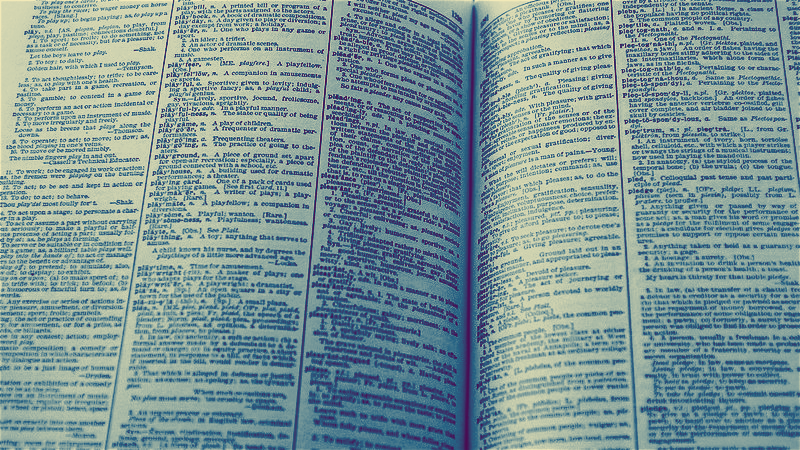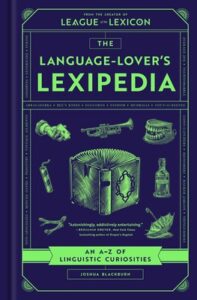
Barf, Funk, Tug, and Other Etymological Mysteries
Joshua Blackburn Explores the Centuries-Long Evolution of the English Language
Every word originates somewhere. It may be borrowed or coined, named after a person, inspired by a place or imitative of a sound. It could have evolved over the long journey from Proto-Indo-European (a reconstructed ancient language for which no evidence exists), or coined just last year. But for anyone interested in etymology—the study of the origin and development of words—there’s pleasure in finding out where, why and when words came to be.
Sometimes etymology is a simple business. Eponyms, for instance. Words like dunce (after John Duns Scotus), nicotine (after Jean Nicot) or diesel (after Rudolf Diesel) are no riddle. Other words, like robot, poodle and porpoise, are fun to discover, but also well-documented.
Then there are the words of Germanic, French and Latin origin that account for much of the English language. These can require more unraveling, and the further back one goes, the more conjecture there is.
Take slang, the informal nonstandard language that fills our world. Everyone knows what slang is, but not where the word comes from. Is it related to the narrow strips of land known as “slangs,” or with the Scots “slanger,” meaning to dawdle, or with the Norwegian “slengjeord,” meaning a mocking word? Neither slang experts nor the OED know.
Which brings us to the three words no etymologist wants to write: “Of unknown origin.” For instance, no one knows the origin of dog. Similarly, frog, hog, pig and stag. They certainly look to be related, but beyond that, etymologists are stumped.
What’s surprising is how many everyday words are “of unknown origin.” One might expect the source of girl or ink or tantrum would be known. But such words often have ancient roots, and the longer the history, the murkier the evidence gets.
*
Words of Unknown Origin
Bad • Badge • Bamboozle • Barf • Basket • Beach • Beaver • Big • Bird • Blare • Bloke • Blur • Boast • Bob • Boffin • Bore • Boy • Brass • Buffet • Bull • Bully • Bump • Bun • Bung • Bunk • Bunny • Bunting • Butt • Calm • Cane • Case • Clock • Coil • Conniption • Conundrum • Copacetic • Craze • Crease • Cricket • Cub • Curse • Dandru • Dent • Dig • Dildo • Dock • Dog • Donkey • Dosh • Drug • Dud • Ewe • Fee • Fib • Flabbergast • Flack • Flare • Flaunt • Fleet • Flew • Flue • Fluke • Fob • Forge • Funk • Gab • Gadget • Ga • Gasket • Gaunt • Gawk • Gaze • Gig • Gimmick • Girl • Gizmo • Gloat • Golf • Gorge • Grail • Grizzle • Grouse • Gun • Haggis • Haze • Hijack • Hockey • Hoodlum • Hug • Humdinger • Hype • Ink • Jade • Jaw • Jitter • Kick • Kid • Lag • Leech • Leer • Log • Love • Marvel • Mug • Nasty • Noodle • Nudge • Pad • Pause • Peat • Perk • Pet • Pink • Plot • Pore • Pound • Prank • Prod • Pry • Punk • Puzzle • Quake • Quandary • Queasy • Queer • Quiz • Race • Ramble • Rat • Rear • Rig • Rogue • Row • Scoundrel • Scout • Shrivel • Shrub • Slang • Snazzy • Sprig • Sprocket • Steer • Stem • Stir • Stooge • Strumpet • Stubborn • Swig • Swill • Tantrum • Tit • Toad • Tug • Twitter • West • Whim • Wick • Yank
Further muddying the waters are the folk etymologies people want to be true. Like marmalade, said to be from Marie est malade, the words whispered to a seasick Mary Queen of Scots by her maid, presumably while munching marmalade on toast. Obviously it’s hooey—marmalade was borrowed from Portuguese, where it came from the ancient Greek for apple—but because people love a good story, it gets shared, along with hundreds of stories like it.
Sometimes the truth is that we don’t know. Some might regard this as an admission of defeat, but there’s also something quite magical about a word whose origins can never be known.
Idioms especially are magnets for folk etymology. And among idioms, the whole nine yards has been called “the holy grail for etymologists” because of the origin stories that swirl around it. Aircraft, ammunition belts, bolts of fabric, mine-working, kilt-making, cement-mixing, nuns, saris and American football have all been marshaled as explanations. And although lengths of fabric seem plausible to this author, the idiom remains “of uncertain origin.”
Etymology itself is from Greek etymon (original, true) + logia (science or study), making it the study of original and true word meanings. But sometimes the truth is that we don’t know. Some might regard this as an admission of defeat, but there’s also something quite magical about a word whose origins can never be known.
*
Don’t Believe Everything You Hear
Brat is not from British Regiment Attached Traveler • Cabal is not from the initials of the plotters seeking to overthrow King Charles II • Cold as brass monkeys has nothing to do with how cannonballs were stored • Crap is unrelated to Thomas Crapper • Fuck you is not from pluck yew • Golf is not an acronym of Gentlemen Only, Ladies Forbidden • Kick the bucket is not to do with public executions • OK is not from Old Kinderhook (or from Scottish och aye, Finnish oikea or German Oberst Kammandant) • Posh is not from Port Out Starboard Home • Raining cats and dogs is not an allusion to the Norse god Odin • Rule of thumb is not to do with husbands beating wives • Saved by the bell is not to do with being buried alive • Shit is not from Ship High In Transit • Snob is not from Latin sine nobilitate (“without nobility”) • SOS does not stand for Save Our Ships (or Send Out Succor)
Language purists like to remind anyone who will listen that decimation actually means the slaughter of one in ten people, and was the military punishment wielded by the Roman army against deserters and mutineers. The same people are also happy to clarify that, strictly speaking, a myriad is 10,000, and not the indeterminably large number most people think. Both claims are correct; that is what the words originally meant. But language is always evolving, and these meanings fell out of use long ago.
This evolution can be a source of frustration, even confusion, when the meaning of words is lost, altered or inverted. But there’s no stopping this tide of change, and never has been. Even a comparison of words pre- and post-internet, such as ping, swipe, text, follow, cloud, troll, sandbox and countless more, shows how they can acquire new senses far removed from their original meanings.
Those who object to these newfangled meanings should reflect on how many commonplace words have been similarly altered without their knowledge. To give them an idea, the following dictionary of changed meanings should help. It is, dare one say, terrific.
*
A Small Dictionary of Changed Meanings
Awful (adj.) (c. 1175): Filled with awe.
Blockbuster (n.) (1942): A large bomb capable of destroying a block of buildings.
Brave (v.) (1619): To threaten.
Buxom (adj.) (c. 1175): Compliant, obedient, easy to influence.
Bully (n.) (1548): A term of endearment between close friends, similar to dear or darling. Later used between men to indicate a good chap.
Cartoon (n.) (1684): A design sketch for a large work of art (such as a fresco, tapestry or stained glass) done on heavy paper.
Cheat (v.) (c. 14 40): To confiscate. From escheat, the legal forfeiture of property.
Clout (n.) (Old English): A patch of metal, cloth or leather used to mend something.
Clue (n.) (1393): A ball of yarn.
Deadline (n.) (1863): From the American Civil War; the boundary line in a military prison beyond which a prisoner might be shot.
Egregious (adj.) (c. 1550): Remarkable, distinguished, of great renown.
Digital (n.) (1450): A whole number less than ten.
Disappoint (v.) (1434): To remove someone from their appointed office, to dismiss them from authority.
Explode (v.) (1552): To reject or replace something, like a custom or tradition. A later, second meaning was to condemn, banish or drive away. By 1614, audiences might explode a performer from the stage with jeering.
Fizzle (n.) (1533): A noiseless fart.
Flirt (v.) (1532): To make a sudden movement; to flick, dart or bound. Typically associated with birds.
Garbage (n.) (1422): Animal offal or entrails used for food.
Girl (n.) (c. 1300): A child or young person, regardless of sex.
Hussy (n.) (1470): A Scottish word for a housekeeper or mistress of the house. Also, the female head of the family.
Luxury (n.) (1340): Lust, lechery, lasciviousness.
Magazine (n.) (1451): A storehouse or depot for merchandise.
Meat (n.) (Old English): Food of any variety, whether consumed by humans or animals.
Naughty (adj.) (c. 1400): Having nothing—naught. Poor.
Nice (adj.) (c. 1300): A foolish or simple person.
Ovation (n.) (1533): A historical word for the processional entrance given to a military commander in ancient Rome who had fallen short of a triumph and therefore received a more modest reception.
Prestige (n.) (1656): A magic trick, an illusion. From a fourteenth-century French word for a conjuror’s illusion.
Pretty (adj.) (Old English): Skillful, crafty or cunning. Also, archaic Scottish word for brave.
Radical (adj.) (1398): Relating to the roots of a plant.
Quiz (n.) (1780): An eccentric person; someone who looks ridiculous.
Secretary (n.) (1387): A confidant, or one trusted with secrets.
Silly (adj.) (1450); A Scottish word meaning worthy or pious.
Stiletto (n.) (1611): A short dagger with a slender, thin blade designed to penetrate armor. From Italian for “little steel.”
Sly (adj.) (1175): Clever, wise or skillful with one’s hands.
Tabloid (n.) (1884): A small compressed substance, like a medical pill or block of tea.
Terrific (adj.) (1667): Inspiring terror, frightful, awful.
__________________________________

From The Language-Lover’s Lexipedia: An A-Z of Linguistic Curiosities by Joshua Blackburn. Copyright © 2025. Available from Avid Reader Press, an imprint of Simon & Schuster.
Joshua Blackburn
Joshua Blackburn is a writer and photographer. He’s also the inventor of the most successful word game in Kickstarter history, League of the Lexicon. His previous books include the award-winning Acme Climate Action and Launderama, a photography book that beautifully documents London’s last remaining launderettes. Joshua created League of the Lexicon for his two sons during COVID lockdown and was the game’s most prolific question writer. He has since become an accidental linguist, appearing on podcasts like The Allusionist, Because Language, The Failing Writers, and Butter No Parsnips. He lives in London with his family, a neurotic cat, and an overly large taxidermy collection.



















